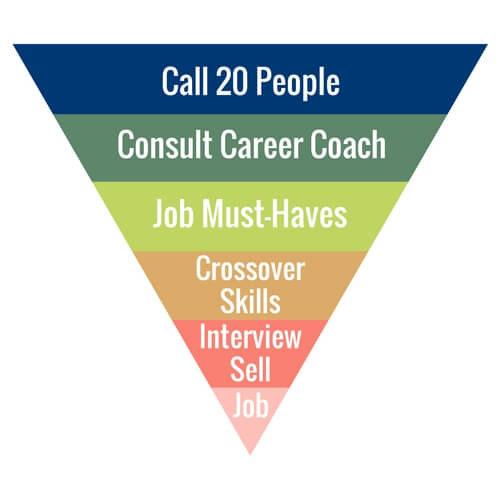At one point or another, we’ve all woken up in the morning for a job we did not feel like going to that day. You may have been thinking “how did I get here?” or “where am I going next?”
Today’s job market, more often than not, expects job seekers to have at least a Bachelor’s degree. This societal pressure inevitably forces eighteen-year-olds to decide their career path when choosing an undergraduate major. Despite feeling pigeonholed to pick an industry and stick with it, it’s definitely possible to change careers after graduating college.
Your dream job will not find you out of thin air. However, taking a few strategic steps in your job search can help you find a new career path quicker than you’d expect.
5 Ways to Change Careers and Find Your Dream Job
1. Pick Up The Phone and Call 20 People
This cliche saying couldn’t be truer: Great people know great people. Start your career search by reaching out to anyone and everyone you know who works in a field of interest, and ask them about their experiences. Schedule 20-minute phone calls throughout your week with family members, friends, LinkedIn connections, or Greek life brothers and sisters.
Speaking with so many people, you’re not going to remember everything they said (hello Excel spreadsheets!). Prepare at least 5 questions for each specific person before the call, and take notes as you go.
2. Invest in a Career Coach Session
After hearing from all your colleagues and third-degree connections, you need to have enough self-awareness to know which opinions to listen and not listen to. It can be helpful to hear an unbiased opinion from expert career coaches (book a session with The Muse or talk to a recruiter at Betts Recruiting). They will give you market insights, lessons from past experiences, and industry trends to help guide you in the right direction. From there, you can narrow down the scope of your search (which is key for saving time).
3. Narrow Down Your Work MUST-Haves
Once you target 2-3 new career paths for yourself and documented relevant information, check in with where you’re mentally at. What is your gut saying? Where do you see yourself being challenged, thriving, and growing? Try to answer these questions:
- What type of work environment do you want?
- Are growth opportunities important to you?
- What do your day-to-day responsibilities look like?
Then, start searching on job boards or connect with a recruiter for the job opportunity that best aligns with your goals and experience. To save yourself the most time (and reduce the number of headaches you’ll have), focus your efforts on applying for one type of role at companies that pique your interest.
4. Identify your Transferrable Skills
Now that you have pinpointed your #1 ideal role, you need to identify your assets. What skills do you bring to the table that would make you perfect for this job opportunity? Use specific and tangible examples of what you did in your previous roles and determine how it directly applies to the role you are applying for.
5. Confidently Sell Yourself in Interviews
Before you can say, “Signed, sealed, delivered, I’m Yours!” you need to strut your stuff. If you are switching careers, you are most likely missing a lot of the qualifications that the job entails. You have to sell yourself as a valuable resource to the hiring manager, even though you may not have every “requirement.” Hiring managers will respond well to your confidence and enthusiasm for the opportunity if you do a great job of showing it to them in interviews.
As a Recruiting Coordinator for Betts Recruiting, and formerly an elementary school teacher, I can assure you changing careers is possible—and exhausting! Be sure to make a game plan for your career switch using these tips, and let me know if I can be of any help. Good luck on your job search!

